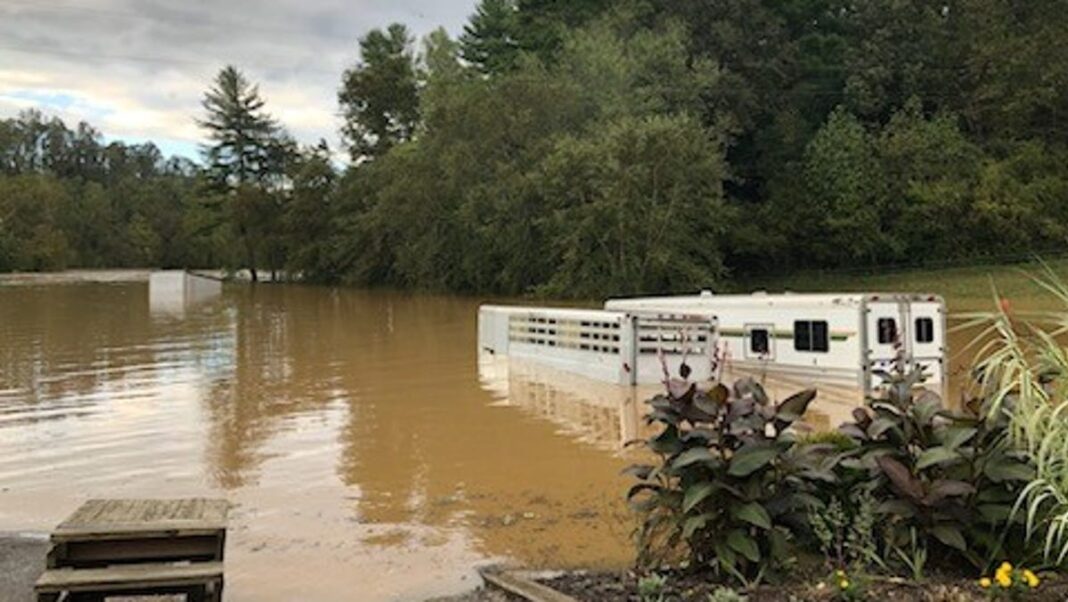Stranded with 54 Horses for 4 Days: Biltmore Estate Team Battled for Water Post-Helene
ASHEVILLE – Following the impact of Tropical Storm Helene on Asheville on September 27, Elizabeth McLean spent two days clearing a path through three miles of fallen trees and debris in order to access the nearest road.
While taking refuge at the Biltmore Estate, McLean was determined to reach the Biltmore Equestrian Center, where four of her staff members and 54 horses were trapped amid the aftermath of the storm and rising waters of the French Broad River.
“It was just a series of obstacles one after another,” McLean, who leads equestrian activities at Biltmore, told the Asheville Citizen Times, which is part of the YSL News Network. She estimated there were around 60 knocked-over trees on the gravel road leading to the barn.
Prior to the storm, four volunteers from the equestrian team set up makeshift beds in the stable’s offices and breakroom to ensure the horses had sufficient food and water to survive what they expected to be a one-night ordeal, but the situation quickly turned into a three-day struggle.
By the morning of September 26, right before their unexpected camping adventure began, McLean noted that two paddocks close to the river were already underwater. Horses unable to be moved to higher ground were placed in barn stalls, with all windows tightly shut to keep out the strong winds and rain.
As they distributed water and hay to the horses, Caroline Wright, the crew leader, continuously monitored flood forecasts from an online river gauge. On Thursday evening, predictions indicated that water levels could rise to 29 feet.
“We were all wondering, ‘What will that even mean?’” Wright shared with the Citizen Times.
With the horses secured overnight, the team woke up “with the sun” to a powerless barn and the French Broad River spilling into their parking area, according to Wright. The river continued to rise throughout the day but fell just inches short of entering the barn.
“I was just watching the rising water and wondering if it would reach the barn and if we would need to evacuate the horses,” Wright recounted.
Wright’s greatest worry came when the water supply was cut off that evening. Surrounded by fallen trees and floodwaters, the team needed to discover a way to provide enough clean water for the 54 horses, each requiring 5 to 10 gallons per day, to prevent serious health issues.
“The river road was completely submerged under 30 feet of water, and another road had around 50 downed trees blocking it,” Wright explained.
“We felt completely cut off. We had enough water for Friday, but Friday night we had to come up with a new plan,” Wright continued.
The team gathered several troughs from outside, collecting enough rainwater to last through the first day. On Saturday, they “miraculously” discovered a water tub in one of the worker’s trucks, said Wright. As their water reserve shrank on Sunday, September 29, they resorted to transporting buckets of water from a nearby creek unaffected by the flooding.
“While managing these tasks, we were also anxious about checking on our loved ones and finding out if they were safe,” said Wright. “We spent time by a Starlink device, hoping to regain some kind of connection.”
Some crew members faced distress as they couldn’t reach their family members during this challenging period.
for at least 24 hours.
“Initially, we were somewhat shielded from the effects, but gradually we started to learn about the situation in other areas and realized how fortunate we were,” she shared.
On the fourth day of their confinement, Wright suddenly heard cries coming from the barn. Turning around, she noticed McLean arriving in a truck. While her team worked tirelessly to keep the horses fed and safe, McLean had managed to reach the road and rendezvous with a coworker who assisted her in clearing a route to the stables.
“I was overjoyed. We all embraced each other profusely. Those were the best hugs we’ve experienced in a long time,” Wright expressed.
With the help of nearby Biltmore employees who assisted in carrying water buckets and clearing fallen trees, Wright reflected that the four days spent isolated with the horses was “a small representation of what has been transpiring throughout the entire region.”
“Community emerges, and we simply look after one another,” she noted.

